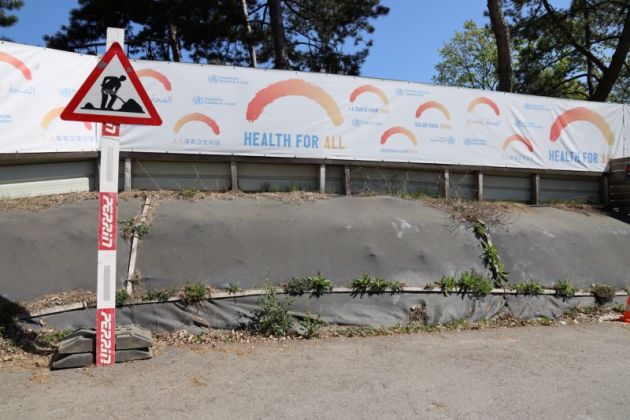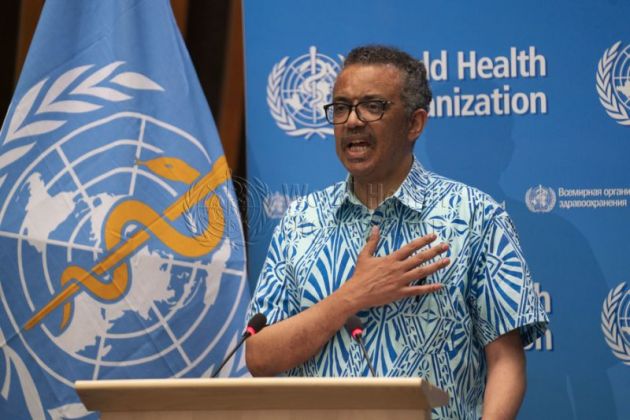Health as a 'primary common good' debated at World Health Assembly

GENEVA - COVID-19 has shown the interdependence between nations and the need to consider health as a "primary common good" that needs solidarity and globally coordinated action the Vatican's representative at the UN in Geneva said at this year's highly-charged World Health Assembly.
The words were those of Archbishop Ivan Jurkovič, the Holy See's Permanent Representative to the United Nations in Geneva, when he addressed the May 18-19 World Health Assembly about the novel coronavirus pandemic.
He said the most unusual circumstances were a striking reminder of what Pope Francis had described as "the night of a world already faced with epochal challenges and now oppressed by a pandemic severely testing our whole human family."
During the annual gathering around world health, his speech sounded like the good thoughts of any responsible church leader at such a conference.
Despite no physical absence of many of the delegates who stayed at home due to the novel coronavirus, President Donald Trump's twitter politics acted to dominate Western media coverage of proceedings of what amounts to the World Health Organization's annual meeting.
INVESTIGATION INTO COVID-19 RESPONSE
It was the first virtual WHA held over two days, instead of a week, and a resolution calling for an investigation into the world's response to the novel coronavirus pandemic gained universal backing.
None of 194 WHO member states, including the United States, objected to the resolution sponsored by the European Union on behalf of more than 100 countries, including Australia, Canada, China, Japan, Russia, South Africa, Ukraine, the UK, and Turkey,
The U.S. statement issued in Geneva said: "We wholeheartedly endorse the call in the resolution for all Member States to provide the WHO with timely, accurate, and sufficiently-detailed public health information related to the COVID-19 pandemic."
The notions of global public good or primary common good floated around the conference but did not get a firm global consensus.
The United States said it refused to accept the wording in two clauses of the resolution.
US CONTESTS 2 CLAUSES OF EU RESOLUTION
One of the issues contested by the United States in the EU resolution, which the Vatican would go along with concerns "sexual and reproductive rights" and abortion, but the one on intellectual property seemed to fly in the face of what the Holy See proposed.
Trump succeeded in focusing the debate on his bird noises from cyberspace rather than on the massive issue facing the world over the novel coronavirus, which had claimed nearly 94,000 lives on May 21.
Trump tweeted the contents of a four-page letter on May 18, threatening to permanently cut off U.S.-funding of the WHO, unless it committed to "major, substantive improvements" within 30 days.
Despite initially praising China's response to what is now a global pandemic, Trump has since attacked the WHO and its Director-General Dr. Tedros Adhanom Ghebreyesus.
The U.S.-based international television channel CNN, on May 19, cited at least 37 separate instances where Trump praised China since January, including one as recent as April 1.
"Last night, I spoke to President Xi. We talked about the experience that they had in China and all of the things that have taken place. And we learned a lot. They've had a very tough experience, and they're doing well, and he's doing well. President Xi is doing very well," Trump had said on March 27.
Trump's tweet on May 18 stepped up his recurring attempts to blame the WHO and China for the spread of the virus when his opponents have accused him of his poor handling of a worldwide public health crisis that is also an American one.
Trump had reiterated his claim that the WHO is China-centric in what appears to be a quest to use baiting the world health body in his swerving presidential election campaigning.
Jurkovič said that at the constant urging of Pope Francis, the Holy See remains adamant that "the most vulnerable of our brothers and sisters living in the cities and peripheries of every part of the world, not be abandoned."
The WHA is the World Health Organization's decision-making body, and U.S.-China tensions came to the fore at the meeting after Trump's tweeting.
'5,000 CATHOLIC-INSPIRED HOSPITALS'
"Throughout the world, some 5,000 Catholic-inspired hospitals, and more than 16,000 Church-based dispensaries, are complementing and reinforcing the efforts of governments to provide healthcare to all," said Jurkovič.
They do that by assuring that the poorest and most marginalized persons "do not lack basic necessities, ...such as medicine and especially the possibility of adequate health care," said the papal representative.
Jurkovič said that during the current "period of suffering and adversity," his delegation had appreciated "the efforts of the World Health Organization to remain in dialogue with religious leaders and religious-inspired organizations."
He praised the WHO in "the common effort to ensure that religious gatherings are held with all the necessary sanitary measures."
Earlier in the week on May 18, all the WHO member states had agreed to an investigation into the WHO's response to COVID-19 after Trump threatened to leave the health body, and permanently withdraw funding.
The U.S. statement contesting two of the clauses in the resolution said, "We do not accept references to 'sexual and reproductive health,' or other language that suggests or explicitly states that access to abortion is included in the provision of population and individual level health services.
'LEGAL PROTECTIONS OF THE UNBORN'
"The United States believes in legal protections for the unborn, and rejects any interpretation of international human rights...to require any State Party to provide access to abortion referring to 'sexual and reproductive health,' or other language suggesting that access to abortion is included in providing health services as the U.S.' believes in legal protections for the unborn.'"
The U.S. also disassociated itself from a paragraph concerning intellectual property. The language in the related sections "does not adequately capture all of the carefully negotiated and balanced language in the World Trade Organization Agreement on Trade-Related Aspects of Intellectual Property (TRIPS) and the Doha Declaration of 2001."
Instead, it said it "presents an unbalanced and incomplete picture of that language at a time where all actors need to come together to produce vaccines and other critical health products."
The United States recognizes the importance of access to "affordable, safe, high-quality, and effective health products and the critical role that intellectual property plays in incentivizing the development of new and improved health products."
'WRONG MESSAGE TO INNOVATORS'
However, it said the drafted paragraphs "send the wrong message to innovators" who would be essential to the solutions the whole world needs.
During the World Health Assembly, the World Council of Churches and All Africa Conference of Churches, in a joint statement, urged closer collaboration between church and church-health facilities and associations.
"The COVID-19 pandemic has brought unprecedented challenges in the world," reads the message. "In Africa, socio-economic structures and livelihoods have been disrupted."
They also noted a corresponding pandemic of fake news and misinformation.
"We are encouraged with dynamic relationships in some countries between churches and church health facilities, whereby Christian health professionals support churches in providing health education, dispelling rumors and misinformation, as well as accompanying the leadership of churches as they make pertinent decisions," read the message.

"In other places, however, churches and church health facilities are working in isolation and the health facilities are not part of the life and witness of the churches, or cooperation is only along denominational lines."
So what is the primary good or the global public health good?
"We can't prevent pathogens, germs from crossing our borders. And that's why these vaccines have to be recognized as protecting the whole of the world and the contributions from every country to do that," Katherine O'Brien, director of WHO's Department of Immunization, vaccines and biologicals, said at video WHO press conference on May 23, stating that COVID-19 vaccines be recognized as for the "global public health good."
"The outbreak of pathogens don't recognize borders. Although one country may be able to vaccinate a high proportion of individuals, and in fact, even induce herd immunity in the country, the transmission of pathogens crosses borders," she said.
"We're all at risk when any country is at risk," said O'Brien who referred to measles.
"Measles anywhere is measles everywhere. And when we have measles anywhere, it means every country must continue to immunize and immunize at the rate that it does protect every individual in the community."
